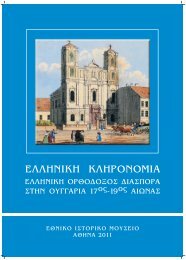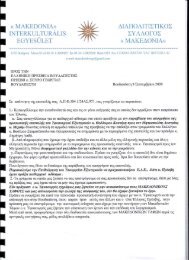Görög Örökség Ελληνική Κληρονομιά - H-ellin.com
Görög Örökség Ελληνική Κληρονομιά - H-ellin.com
Görög Örökség Ελληνική Κληρονομιά - H-ellin.com
You also want an ePaper? Increase the reach of your titles
YUMPU automatically turns print PDFs into web optimized ePapers that Google loves.
Testators and Heirs Greek<br />
families from the Hungarian Past.<br />
After the expulsion of the Turks from Hungary, the time for Reconstruction came. This<br />
means that the number of free royal cities multiplied along with the settlements in the plains. Those<br />
settlements were relatively safe and could easily organize a business network. In those settlements<br />
but also in the whole country there were markets organized that were gradually increasing with the<br />
presence of traders from the Balkans, who were Turkish citizens and received a lot of tax and<br />
custom facilitations. They were very bold and courageous business-people and prevailed in those<br />
areas where the business spirit was absent. The Greek, Armenian and Serbian traders quickly<br />
organized business networks in the settlements of Alföld, while at the same time, they appeared in<br />
big cities.<br />
At the beginning they were s<strong>ellin</strong>g door-to-door, then appeared in fairs and later settled in<br />
shops, which they were renting. The secret of their success was that they were s<strong>ellin</strong>g their products<br />
at prices lower than those of the local Hungarian and German traders and for that reason they were<br />
constantly facing trouble with the local authorities. However, they were warmly wel<strong>com</strong>ed by the<br />
citizens and landowners. They started and prevailed as wholesalers but gradually gained reputations<br />
as retailers, too, while the royals put pressure on them to settle permanently in the empire.<br />
In 1774, only the Greeks who took an oath of faith and became citizens of the empire took a<br />
license for free trading and settled in Hungary. That meant that the government of the Hapsburgs<br />
accepted them pleasantly in other financial actions that were not involved with trading or industries.<br />
Those who swore faith to the government gained the opportunity to buy or rent real estate, as well as<br />
farming land. Thus, the Austrian traders and manufactures were not in danger. The Greeks settled in<br />
the cities of Gyor, Vac, Komarom, Pest, Dunapenteld- /Dunaujvaros/Dunafoldvar, Gyöngyös<br />
Karcag, Miskolc, Eger, Debrecen, Szeged, Szentes, Kecskemet.<br />
Once settled in those cities as legal citizens, they continued their financial activities, created<br />
wealth and became owners of land and real estate. A lot of them gained a title of dignity and the next<br />
generations participated in the city's administration, even the governing of the state.<br />
With the fortune they made, they financed the building of orthodox churches, schools and<br />
hospitals in the biggest cities ( Gyor, Vac, Pest, Gyöngyös, Karcag, Miskolc, Kecskemet, Szentes,<br />
Szeged etc ). In many cities they had churches together with the Serbians, who they shared the same<br />
religious belief with. The Greek and Serbian Communities were very pleased with the Bishop of<br />
Buda, Dionyssios Popovits, born in Kozani in 1790. From the Balkans, the traders that prevailed in<br />
the business sector in Pest were the Greeks. One of the most important families with great influence<br />
was the Nakou family. Christoforos Nakos along with his brother Kyrillos had bought since 1780 a<br />
lot of acres of land in south Hungary, the county of Torontal. There, they cultivated the wheat and<br />
developed stockbreeding. The "House of Nakou" was in Vaci street, number 9 and on the basement<br />
there was a shop where they sold silk and fabric. In the 19' century, in Pest the Nakou Palace was<br />
next to the Chain Bridge and was bought by the Dera family to whose possession it remained for 40<br />
years. The Dera family was one of the richest families in Pest and assisted Szechenyi's reformative<br />
ideas. When Georgios Sinas married Kataliné Dera, their immense family fortunes were joined<br />
together. The Charisis family was very famous and a member of the family was the first ambassador<br />
of Greece in Pest. Pavlos Charisis with his wife established the Chariseio Institute that helped<br />
Greeks learn the greek language in Greece. Moreover, they financed the building of new schools in<br />
Kozani. The Sakellaris family was involved in trading paper and leather goods and were elected tax<br />
payers in Pest due to their vast fortune. The biggest business centre in Pest belonged to the Mano<br />
family and one of their descendants was a banker. The family palace still exists in the county of Pest.<br />
85




